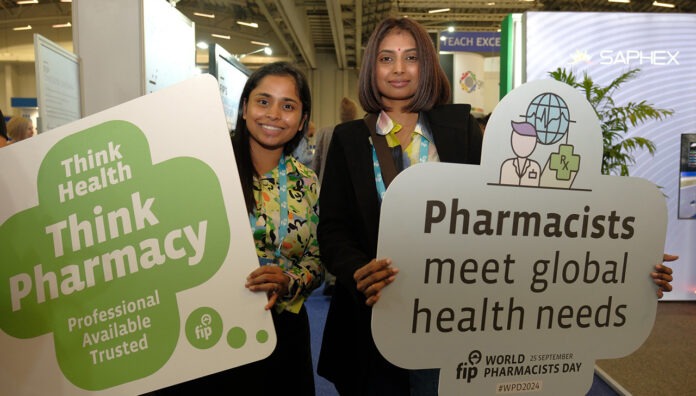Pharmacists present to the International Pharmaceutical Federation (FIP) on unique services in their country to improve patient health and safety.
As the 2024 FIP World Congress continues, Australian Pharmacist reports from Cape Town on some innovative services presented which are improving health across the globe.
South Africa: Improving access to HIV treatment and prevention
There are 7.9 million people in South Africa between the ages of 15 and 49 years living with HIV. Despite strides in treatments and preventative therapies, the rate of new infections remains high.
One project driven by pharmacists is aiming to change this, allowing community pharmacists to initiate high-risk young women and men onto HIV Pre-Exposure Prophylaxis (PrEP). In this implementation study, 10 pharmacies in Gauteng and the Western Cape (Cape Town) initiated high-risk individuals on combination tenofovir and lamivudine/emtricitabine for a period of 13 months. Patients were recruited inside and outside of the pharmacy.
Of the 838 potential participants, 88% (n = 737) were initiated on PrEP between June 2023 and January 2024. Risk assessment found most were sexually active, and more than three quarters (n = 595) engaged in sexual activity without a condom. Initial results from the study were positive, with further analysis to explore patient perceptions of PrEP initiation in community pharmacy.
Spain: Pharmacy reporting of stock shortages helps detect shortages sooner
The General Council of Pharmacists of Spain has developed two systems to prevent and mitigate medicine shortages.
The first is CisMED, a system that generates real-time information on supply incidents at a pharmacy level.
Over 10,000 pharmacies participated in this initiative in 2023 – over half of all pharmacies. CisMED reported a 30% increase in medicines that could not be supplied, with over half the alerts generated being for medicines not listed by their regulator, the Spanish Medicines Agency.
The second initiative, FarmaHelp, is a communication system which allows pharmacists to communicate with nearby pharmacies when a request for a medicine cannot be fulfilled. From the 10,000 pharmacies connected to the system, the number of medicines ‘found’ increased from 106,925 to 389,364. This meant 73.5% of the time, the pharmacist was able to offer a solution to the patient due to the FamraHelp system.
In combination, these digital systems have helped pharmacists both contribute to a more accurate and complete medicine shortage database, and allowed pharmacists to find more options to support access to scarce medicines to their patients more often.
The Netherlands: Palliative care kit improves access to care at end-of-life
The decision to initiate palliative care is often a time where medicines need to be prescribed and initiated at short notice, with a new and often complex regimen of medicines.
A project in The Netherlands led by the Royal Dutch Pharmacists Association, is trying to make this a smoother process for patients and their families through the introduction of a ‘palliative care kit’.
Based on the concept of a first-aid kit, the ‘palliative care kit’ contains everything patients will need to facilitate administration of medicines at end-of-life. This includes morphine and midazolam ampoules, syringes, needles, bandages and a urinary catheter with insertion set.
The kit is supplied by a pharmacy, which receives reimbursement for the medicines, and a professional fee for facilitating the supply of the kit.
The kit contains a permission document from the GP to use the supplies when necessary. The kit is delivered to the home of palliative patients when they enter the terminal phase at a time that can be planned. This allows a nurse to immediately use that kit when necessary.
The kit has reduced unnecessary time spent by community nurses, GPs and pharmacists in facilitating palliative care, particularly during evenings, nights and on weekends. Families report the presence of the kit reassuring because they know their loved one will be able to access the medicines they need instantly, should they experience acute deterioration.
Thailand: Medicine reviews for high-risk CKD patients
In Thailand, 30% of people with chronic kidney disease (CKD) use NSAIDs or other herbal medicines which may accelerate the progression of CKD. A pilot project has shown pharmacists can help reduce this.
In this pilot, a nurse at the CKD clinic referred patients (n = 23) with medicine problems to a pharmacy for medicine reconciliation, adherence checks and to review for potential causes of acute kidney injury. Importantly, the pharmacist also managed any problems identified and monitored kidney function for at least 3 months.
Half (52%) of patients stopped using NSAIDs, and kidney function improved from Stage 3 to Stage 2 in five patients within 3 months. While not statistically significant, the small pilot concluded the model of care appeared to reduce costs associated with medicines and CKD management.
Australian pharmacist on SA TV!
Meanwhile, Australian pharmacist and FIP President Paul Sinclair AM MPS has appeared on South African breakfast television to talk about the important role of pharmacists. Paul told SABC’s Expresso Show he was excited about the opportunities around the world for pharmacists.

‘Health care across the world is changing very quickly. It’s being driven by innovation, and pharmacists historically have embraced innovation and technology,’ he said.
‘What excites me most about our profession at the moment is that we have the chance to do more. Our scope of practice is expanding rapidly, and with that comes opportunities to help more people deliver more outcomes and improve the health system.’



 Dr Peter Tenni[/caption]
Dr Peter Tenni[/caption]
 How should we deprescribe gabapentinoids, according to the Maudsley Deprescribing Guidelines[/caption]
How should we deprescribe gabapentinoids, according to the Maudsley Deprescribing Guidelines[/caption]



 Pharmacists have always prescribed, but they have the potential to prescribe much more
Pharmacists have always prescribed, but they have the potential to prescribe much more





